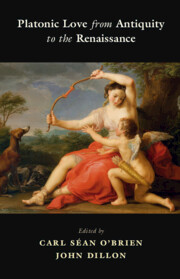Book contents
- Platonic Love from Antiquity to the Renaissance
- Platonic Love from Antiquity to the Renaissance
- Copyright page
- Contents
- Acknowledgements
- Notes on Contributors
- Introduction
- Part I Love in Plato
- Part II Development of Platonic Love in Antiquity
- Chapter 5 Plutarch
- Chapter 6 Love in Plotinus’ Thought
- Chapter 7 A Platonist ‘Ars Amatoria’
- Chapter 8 Desire and Love in Augustine
- Part III Love and Metaphysics during the Middle Ages
- Part IV Platonic Love during the Renaissance
- Bibliography
- Subject Index
- Index Locorum
Chapter 5 - Plutarch
Expanding the Horizons of Platonic Love
from Part II - Development of Platonic Love in Antiquity
Published online by Cambridge University Press: 25 August 2022
- Platonic Love from Antiquity to the Renaissance
- Platonic Love from Antiquity to the Renaissance
- Copyright page
- Contents
- Acknowledgements
- Notes on Contributors
- Introduction
- Part I Love in Plato
- Part II Development of Platonic Love in Antiquity
- Chapter 5 Plutarch
- Chapter 6 Love in Plotinus’ Thought
- Chapter 7 A Platonist ‘Ars Amatoria’
- Chapter 8 Desire and Love in Augustine
- Part III Love and Metaphysics during the Middle Ages
- Part IV Platonic Love during the Renaissance
- Bibliography
- Subject Index
- Index Locorum
Summary
The influence which Plato’s theories of eros and philia exerted on Plutarch’s Advice to a Bride and Groom, On Isis and Osiris and his Dialogue on Love (Erotikos/Amatorius) are examined in light of the enormous chronological, cultural and philosophical distance between Plato and Plutarch. Plutarch’s methodological approach, reconciling his own opinions with the diverse views – which he saw as authoritative – expressed by Plato in the Symposium, Phaedrus and Laws, is considered. In his Advice to a Bride and Groom, Plutarch’s presentation of a philosophically informed love within marriage is presented as a counterpart to the early stages of Plato’s lover. Similarly, On Isis and Osiris, also presents a ‘companionate marriage’. However, the Erōtikos is the most important Plutarchan work dealing with Platonic love. Here Plutarch must prove not only that married love is natural, and homosexual love against nature (though he does not condemn it as a general principle), but also that women are worthy of love, and, if not already virtuous, can through the influence of the lover be brought towards virtue. The extent to which Plutarch rewrites the Platonic dialogues on eros in a new way, set in the imperial Roman world, is demonstrated.
Keywords
- Type
- Chapter
- Information
- Platonic Love from Antiquity to the Renaissance , pp. 83 - 110Publisher: Cambridge University PressPrint publication year: 2022

